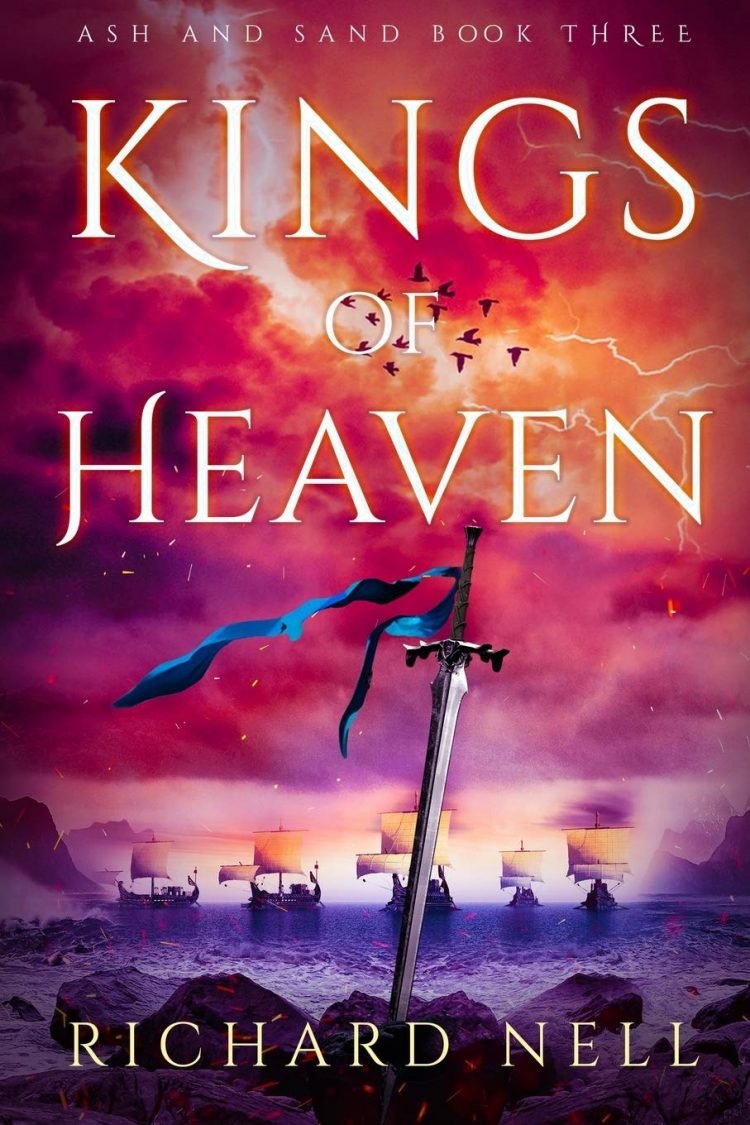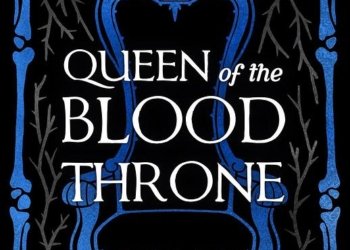No products in the cart.
Kings of Heaven by Richard Nell (Ash and Sand #3)
“A man fails in only two ways. He quits, or he dies.”
At the time, I was unaware that 2017’s Kings of Paradise constituted a significant turning point in my reading life. My mind was clear and carefree before reading Nell’s work; I was not aware of the existence of Ruka, the demon-spawn, the eidetic barbarian genius, the God-tongue, or that he was the son of Beyla and the brother of Bukayag. Since that time, the possibilities of how Ruka’s story would unfold, his purpose, how his mind actually thinks, and the fate of people who love and despise him have haunted me in my own mind-grove.
I’ve unintentionally compared numerous anti-heroes to Ruka in recent years and found them all wanting. Nell’s creation is the only character that has captivated my interest, and I consider him to be the most intriguing anti-hero among the works of fiction I’ve read. It’s safe to say that Kings of Heaven, the novel that wraps up Ruka’s journey, was one I eagerly anticipated. But after reading a few chapters, I understood that this was no longer Ruka’s story.
“Every man has his use.” He whispered the words like a prayer. “Every man should have a choice.”
It was time to unify the lands of Ash and Sand after two novels of pain and suffering, crushed hopes, and snapped spears. With the rest of the world watching, Ruka has been propelled into the final battle with the Narianians because to the presence of Farahi, Dala’s manoeuvring, and Kale’s tenacity. But as the plot lines came together, I realised that we were really spending less time with Ruka than I had anticipated. I’ll admit that I had my doubts about the idea at first.
We were exposed to the melodies of skalds, touched upon the cultures of the horse riders of the steppes, and learned what long-time sailors cherish most as a result of the increased prominence given to several secondary characters. The surrounding cultures are much more vividly revealed to us, and as a result, the significance of what Ruka is fighting for is greater than ever.
“Ruka stood with the men and gripped iron, resisting the urge to pray. He looked at his mother’s kinsmen, bare chested and burnt, standing with continental men of peace and island sailors, all in common purpose. The tide swelled at their waists, the sky cracked and thundered with a growing storm, and Ruka wished all his life could be spent like this.”
It has long been known that Ruka can view any part of his life in perfect detail and on demand since his mind functions similarly to a DVR. Additionally, no amount of prior trauma has the potential to get better with time; every emotion can be remembered and yet seem as raw as when it originally happened. His ability to deal with tragedy like the ordinary person is built to deal with it is impacted by a life filled with painful memories that never have the luxury of getting easier with time.
Even though our beloved Ruka is strong, odd, and delightfully insane, I believe it is reasonable to say that all of this suffering has resulted in a severe inferiority problem. No matter how much good he accomplishes, he is always responsible for whatever negative outcomes he can draw. He just can’t claim sole credit for anything good, yet he exalts his adversaries as heroes despite the fact that his own accomplishments are significantly bigger. The burden of being cursed and malformed at birth follows him throughout his life.
I’ve been holding out hope that he will see the worth of his accomplishments before he passes away—not merely for the accomplishment of his goals, but also as a retroactive shift in his perspective throughout his entire life. One of the themes in Kings of Heaven that I particularly loved delving into was how Ruka was able to find calm, as I believe it provided insight into how he would assess his value under pressure. It was one of many masterfully crafted, breathtaking instances of character nuance that lift Ruka’s story to exceptional heights.
“Only broken things know the hollow tragedy of victory. Success is a cheap balm slathered over a festering wound. It’s never enough.”
The only thing that bothered me while reading this novel was that I wished there had been a little bit more of it. Not out of self-interest because the trilogy was coming to a conclusion, but rather because I thought a few scenes could have been included to give the plot a little more depth. There are a few time leaps that I had assumed the reader would be aware of, but I can see why Nell would want to maintain a consistent flow toward the climax without veering too far from it. There are also some possible hints at discoveries by omission, which will spark discussion among the fan base in the coming weeks and months. But this is already a long trilogy, so I know how wishing for more chapters of it sounds.
One of my all-time favourite series comes to an exciting conclusion in Kings of Heaven. My worries were allayed and my hopes were surpassed. It astounds and depresses, and it gives the cast the proper resolution. I was thrilled and exhausted but yet completely satisfied as I turned the last page. Kings of Heaven fulfils all the requirements for a satisfying conclusion while also making me yearn for more tales set in this time period. Even though Ruka’s story may be done, he has transformed the world in a way that will have an effect for many years to come. I consider myself a little part of that heritage because I will surely remember Ruka’s narrative on my next, arduous adventures.
The Review
Kings of Heaven
8.3 Score
I am just here because just like all the other fantasy addicts who have turned reading fantasy into a lifestyle and who have read this series, I eagerly await the next trilogy. It may very well be steampunk, i daresay, with worldbuilding on a new continent. Congrats Richard Nell for a job well done, I know in my heart your obra is yet to come. Looking forward to future publications.
PROS
- This is going to be another classic.
- Should be fantasy canon.
- The familiar sadness of finishing a great story.
- Seriously the best book I've ever read.
CONS
- No Freaking Way.
- Bad in so many ways.
- Characters I just didn’t care about.
- Disappointing Follow-up.











